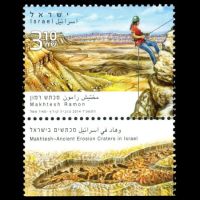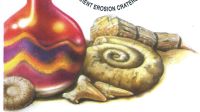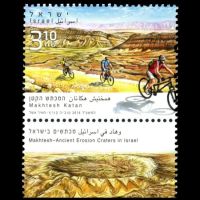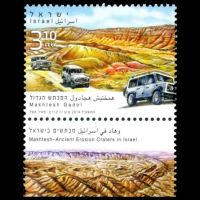Israel
2014
"Makhtesh Ancient Erosion in Israel"
| Issue
Date |
11.02.2014
|
| ID |
Michel:
Stanley Gibbons: UPU: IL007.14
Category: pR |
| Author |
Tuvia
Kurtz & Meir Eshel |
| Stamps
in set |
3 |
| Value
|
IS
3.10 - Makhtesh Ramon
IS 3.10 - Makhtesh Gadol
IS 3.10 - Makhtesh Katan
|
| Size
(width x height) |
30 mm X
40 mm
|
| Layout |
3
sheet
of 8 stamps each |
| Products
|
FDC x
1 |
| Paper |
|
| Perforation |
13 |
| Print
Technique |
Offset
with Microtext security mark
|
| Printed
by |
Cartor
Security Printing, France |
| Quantity |
|
| Issuing
Authority |
Israel
Post Ltd.
|
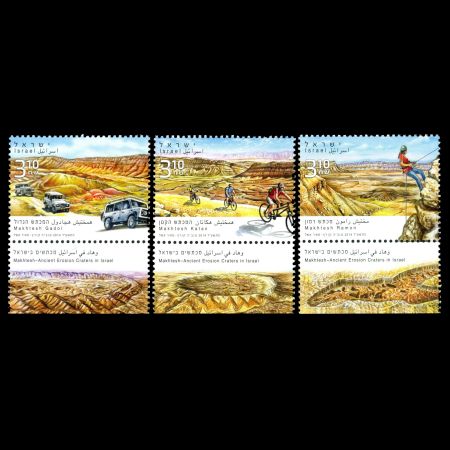
On February 11, 2014 Post authority of Israel issued a set of 3 stamps
"Makhtesh – Ancient Erosion Craters in Israel".
The dynamic earth has
formed almost unique geological landforms in the Negev desert.
Initially, a layered sequence of hard limestone and dolomite rocks was
deposited over softer sandstone sediments. The sequence was folded into
asymmetric folds, producing four parallel, northeast - southwest,
topographical ridges. An erosion surface removed the hard limestone and
dolomite rocks of the fold’s crest, exposing the underlying friable
sandstone, which was eroded, forming a deep transverse valley. The
creeks drain into the Dead Sea - Arava valley, through a single outlet,
incised into the southeastern flank. The closed valleys are surrounded
by steep cliffs, 200–400 m high. A This type of breached valley or
erosion crater of this sort is known as a “makhtesh”. A makhtesh is a
“geological window”, through which the ancient strata are revealed.
A
makhtesh contains a variety of different colored rocks, and diverse
fauna and flora. The area of each makhtesh has been declared a nature
reserve, providing an ideal location for recreation and leisure with
trails for hiking, cycling and jeep tours.
Makhtesh Ramon
Makhtesh Ramon, located near Mitzpe Ramon, is the
largest crater, up to 40 km long, 9 km wide, and 500 m deep. It has
been designated as a national geological park. The sandstone,
multi-coloured clays and gypsum rocks were mined in the early days of
the State of Israel, forming the basis of the ceramics industry in
Israel. To add to the diversity of the geology, dark basalt volcanic
rocks are exposed and eroded into hexagonal columns. The sedimentary
rocks have been intruded by rare magmatic rocks with an unusual suite
of metallic minerals.
Makhtesh Ramon is a geologists paradise with fossils, rock formations
and volcanic and magmatic phenomenon dating
back as much as 220 million years. The Ramon crater began forming when
the ocean that covered the desert began to move north. Water and other
climatic forces slowly began to flatten the curve on top. Much later,
the Arava rift valley was formed and the rivers began to change their
flow. As this occurred, it carved out the crater. The crater is about
1,650 feet (500 m.) deep. Some rocks at the bottom of the crater can be
dated back 220 million years. A black hill in the north, Giv'at Ga'ash,
was once an active volcano. Also, vertical dikes of magnum which
squeezed upward through fissures can be seen at various spots through
the makhtesh. The lowest spot in the crater, Ein Saharonim, contains
its only natural water source. From the visitor’s center, it is
possible to get a spectacular panoramic view of the crater. |
Makhtesh Gadol (left)
Makhtesh Gadol (the large crater), located near
Yerucham, is the second largest crater, 5 km by 10 km, and is drained
by Nahal Hatira. The erosion has exposed a fossil forest. The varied
and colourful sand provide an opportunity to develop artist skills by
filling bottles with different sands. The white quartz sands are
quarried for the glass industry.
Makhtesh Katan (right)
Makhtesh Katan (the small crater), located near
Dimona, is the most perfect of the Negev craters and is 5 km by 7 km.
It is surrounded by steep limestone cliffs, and drained by Nahal
Hatzera. To the east are rehabilitated rich phosphate rock quarries. |
|
Products
| FDC |
Mini Sheet |
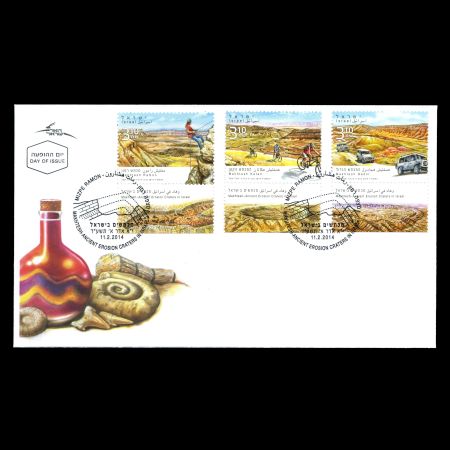 |
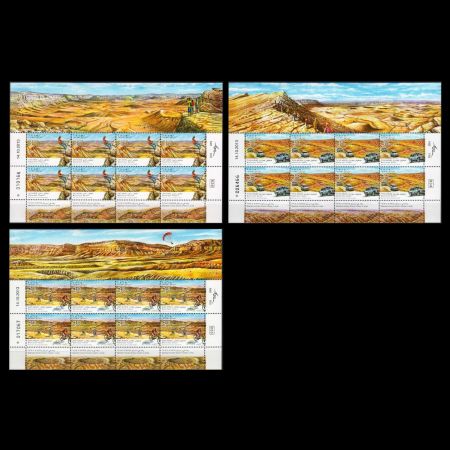 |
References:
Info Brochure,
Jewish Virtual Library,
History of Israel,
Israel Philately.



